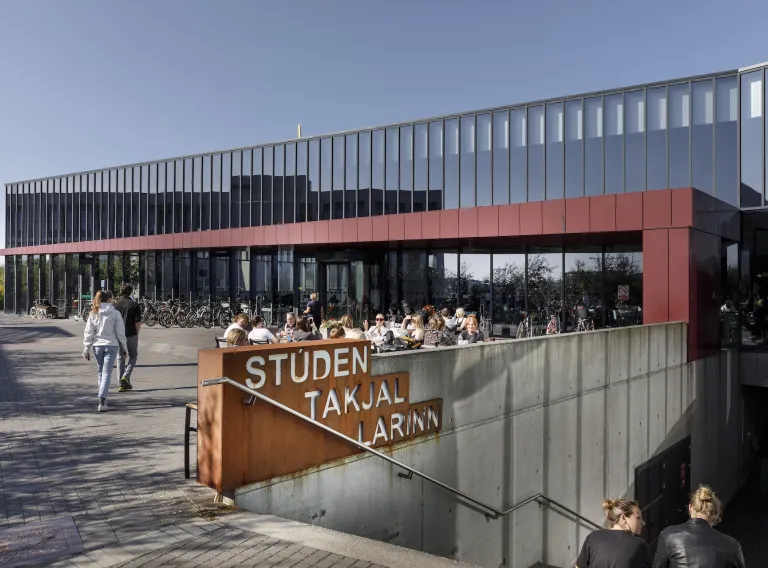

Exchange studies are available for undergraduate and graduate UI students in most subject fields. The best time for exchange studies depends on the study programme, so it is important to consult the programme coordinator or the faculty’s international coordinator for guidance.
While on exchange, students are expected to take a full course load at the host institution, 30 ECTS per semester or according to the host institution‘s guidelines of a full course load.
Some schools/faculties at the University set various requirements for prospective exchange studies. It is important to carefully check requirements at the relevant school/faculty as well as general requirements.
- Undergraduate students can only apply for mobility abroad if their programme at UI is at least 90 ECTS credits.
- Undergraduate students must have finished at least 60 ECTS credits in their study programme at UI before the mobility starts. Students in their first year can apply for exchange studies and go abroad in their second year, provided they have completed 60 ECTS before starting the mobility.
- Students should have at least 22 ECTS worth of courses remaining of their programme to go on exchange for one semester and 44 ECTS remaining to go for two semesters. It is important to note that going on exchange in your final semester can delay graduation, since some host universities issue transcripts after the graduation deadline at the University of Iceland.
- Students can only participate in an exchange programme through their major, not their minor.
- All students going on exchange must complete at least half of their study programme at the University of Iceland and graduate from the University of Iceland.
- Graduate students can only apply for an exchange if their study programme is at least 60 ECTS.
- Graduate students need to have finished 30 ECTS in their study programme before going on an exchange. Students who plan to pursue graduate studies in the same programme as their undergraduate degree are exempt from this rule.
- Students must be accepted and enrolled at UI before the mobility period starts. Graduate students who do not have any grades on their transcript must submit a transcript from their undergraduate studies with their application for exchange.
- Doctoral students must be accepted and enrolled at UI before they can apply for exchange studies.
- Students are generally expected to have an average grade of 6.0 or higher when they apply for exchange. Some partner universities might require higher average grades from students and further information can be found on the websites of each university. It is possible to apply for an exception from this rule to the International Division. For example if students face some learning difficulties.
- Students can apply for one academic year at a time. If students wish to extend their exchange studies from the spring semester to the following autumn semester, they must submit a new application to the International Division before the 1. February application deadline.
- Students may not go on exchange at two different universities during the same academic year, i.e. attend one university for full-time studies in the autumn semester and another one for full-time studies in the spring semester.
- Undergraduate diploma students can only apply for an exchange if the diploma is at least 90 ECTS credits. Students can only go on a study exchange for one semester and must have completed 60 ECTS credits before the exchange programme begins.
- Students are generally not permitted to enrol in distance courses at UI while on mobility. Students may ask for an exception to this requirement if they need to finish a mandatory course to graduate on time. It is only possible to take one course as a distance course from UI each semester.
- Some faculties and schools at UI have additional requirements for exchange. Students must ensure they are familiar with the relevant requirements of their faculty or school.
- Students enrolled in micro-credential programmes cannot apply for mobility opportunities.
Faculty of Sociology, Anthropology and Folkloristics:
Master's students in anthropology must have finished one semester of their programme before they go abroad for exchange studies.
The Department of Anthropology does not permit students to take language courses during exchange studies.
Faculty of Social Work:
At the undergraduate level, students are advised to go on exchange during the autumn semester of their second year, as the required courses eligible for credit transfer are taught in the autumn semesters of the second and third year. However, students are also allowed to go on exchange during the spring semester if they prefer.
Students can get a maximum of 30 ECTS credits recognised from exchange studies. Of these, 18 ECTS can be transferred as electives, in addition to the following required courses: FRG315G School Social Work (4 ECTS), FRG316G Forensic Social Work (4 ECTS), and FRG501G Multicultural Social Work (4 ECTS).
At the graduate level, exchange studies are evaluated on a case-by-case basis.
Faculty of Economics:
Students can not take comparable courses both at UI and at the receiving institution.
Faculty of Law:
Exchange is only available for graduate students. Students can go on exchange for one semester (30 ECTS, autumn or spring semester). Students must have completed a BA degree in law before the start of the exchange.
Students in natural resources law or international environmental law are not permitted to go on exchange, as these programmes are made up exclusively of mandatory courses. According to rules at the Faculty of Law (reglur um skiptinám, mat á utandeildarnámi og M-námskeið), courses (at other faculties or schools) cannot be evaluated if the Faculty of Law offers comparable courses. Therefore, it is not possible to earn credits by taking a different course as an alternative to a mandatory course.
Faculty of Political Science:
Students enrolled in 120 ECTS undergraduate programmes cannot go on exchange.
Faculty of Business Administration: students cannot take comparable courses both at UI and at the receiving institution
Students in a 90 ECTS credits master’s programme can have a maximum of 30 ECTS credits recognised from exchange studies, while students in a 120 ECTS credits master’s programme can have a maximum of 45 ECTS credits recognised from their exchange studies.
Faculty of Nursing and Midwifery:
Nursing students cannot take courses at partner universities abroad as exchange students. It is only possible to for abroad for clinical training for one to two weeks.
Faculty of Pharmaceutical Sciences:
All courses taught in pharmaceutical sciences (BSs and MSc) are mandatory courses. Students must therefore find courses at partner institutions that are comparable and that can be a challenge. The faculty encourages students who want to go on exchange to see the advice of the educational committee of the faculty. Students will need to work on their applications with the committee and depending on the circumstances they could get permission to go on exchange without getting the courses taken recognised, or only the courses the committee has approved.
Faculty of Medicine:
All courses taught in Medicine are mandatory courses and therefore it can be challenging to find courses at partner universities that are comparable. Most students rather find collaboration opportunities abroad and work on the 3rd year research project in the spring of the third year, or during the elective period in the spring of the 6th year. It is possible to apply for Erasmus+ traineeship grants to work on a research project for a minimum of two months.
Physical therapy study programme:
Usually students go abroad for clinical training/traineeships rather than to attend courses as exchange students as the organisation of the study programme is often very different. It is therefore only possible to go for clinical training at the graduate level. If a student is interested in going abroad for exchange studies at the undergraduate level it is recommended that they reach out to the office of the study programme and gather information on the courses available at the host institution.
Faculty of Food Science and Nutrition:
No specific requirements but students should plan their exchange in close cooperation with their faculty.
Faculty of Psychology:
It is easiest for students to go abroad for one semester and take elective courses during their exchange. If students want to go abroad for one year they must find courses at the host institution that are comparable to courses taught at UI. Students can discuss with the faculty whether courses are comparable.
Faculty of Odontology:
It is most common that fifth year students go on mobility as it fits best with the organisation of the studies.
Faculty of Icelandic and Comparative Cultural Studies:
General linguistics
Students in general linguistics may only go on exchange for one semester.
Icelandic as a second language:
The programme Icelandic as a second language does not allow semester-long exchange studies.
Students who have completed 60 ECTS credits at the undergraduate level (BA degree) may apply for a short-term exchange stay (5–30 days).
Students must consult the programme coordinator regarding course selection before submitting their exchange application through the application portal in UGLA (the University intranet).
Creative writing:
MA students in creative writing can apply for exchange studies for one semester. Students cannot go abroad in the first semester of the programme.
Icelandic:
- Undergraduate - Students on the 180 ECTS programme in Icelandic may only go on exchange for one semester. Students should seek guidance from the head of department when choosing universities and courses.
- Graduate - Students in Icelandic studies, literature, and linguistics can study abroad for one semester (30 ECTS).
Language technology:
Students in language technology can take specialised language technology courses abroad. Students should consult the programme director when choosing universities and courses.
Faculty of Languages and Culture :
Japanese language and culture:
Students must have completed two years (four semesters) of their programme before they can go on exchange.
Chinese studies:
Students enrolled in the 180 ECTS programme need to have finished two years (four semesters) of their programme before they can go on exchange and can stay for two semesters. Students in the 120 ECTS programme have the opportunity to go on exchange during the fourth semester.
Graduate students must generally have completed 30 ECTS to go on exchange. Students in five-year continuous graduate programmes are exempt from this rule.
Students must have completed all compulsory courses in the first year of undergraduate studies and their average grade cannot be lower than 6.0.


